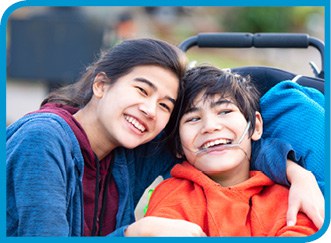Family Caregiving: Key Support Resources in Family Caregiving (FS1932, Oct. 2019)
Family Caregiving: Tips and Tools for You and Your Loved Ones

(iStock.com)
Support and resources in the caregiving process come in many forms: prayer, talking to family or friends, visits with professionals or assistive equipment. Accessing support and resources can provide an important source of understanding, connection and assistance. One of the most important aspects of managing life as a caregiver is accessing useful resources that can provide needed knowledge, skills or assistance. Three commonly recognized categories of support resources in family caregiving are:
- Informal support resources – family members, friends, co-workers, faith community members, etc.
- Formal support resources – home health services, community programs, support groups, etc.
- State and professional resources – state government programs or agencies, federal government, national associations (AARP, Parkinson’s Foundation, etc.)
Use these support types as a guide to identify the resources that may be of most help to you in family caregiving.
Informal Support Resources for Family Caregivers
A major source of support in the caregiving process comes from “informal support” sources: family members, friends, neighbors, faith community members or others. Often, these individuals are willing to provide support but may be unaware of what is needed or how to be helpful.
Caregivers must learn to advocate for themselves. Avoid withdrawing from family members and friends because this will lead to a sense of isolation and discouragement. Instead, identify individuals in your circle of informal support that could be approached with a request for support in the caregiving process. Reluctance in asking for and accepting help is a major barrier in getting necessary respite and support.
List three to five individuals you can identify who could be part of an informal circle of support or caregiving team in your life or the life of someone you know.
- ______________________________________________
- ______________________________________________
- ______________________________________________
- ______________________________________________
- ______________________________________________
Formal Support Resources for Family Caregivers
A variety of formal support sources that are designed to assist in caregiving are available in community settings. Community resources can include everything from a home delivery meal service (Meals on Wheels) to transportation for disabled adults to adult day care facilities.
Community-based support services and programs are the second major source of support that caregivers can access for information and assistance. Such sources can assist with care management, in-person support and other caregiving needs. Most communities or counties have a senior center or contact for aging services that can connect you with services and supports available in your nearby community.
Support groups can be an important and valued source of insight, connection and experience. For example, one way to meet others is to attend a caregiving support group in your community. You may find others in a similar caregiving situation by attending community workshops or meetings held by local chapters of need-specific organizations, such as the Alzheimer’s Association or the Parkinson’s Association.
List three areas for each category where you or someone you know might benefit from formal support resources in the community.
Type of Need (meals, respite, etc.)
- ________________________________
- ________________________________
- ________________________________
Support Group (Alzheimer’s, etc.)
- ________________________________
- ________________________________
- ________________________________
State and Professional Resources for Family Caregivers
In addition to informal and local community-based formal resources for caregivers, many sources of information and assistance exist at the state, national or professional association level. At the state level, state departments or agencies dealing with human services, social services, health or aging often have databases and information systems designed to assist caregivers.
At the national level, the federal government and national organizations such as AARP have information resources and programs to assist caregivers. In addition, many local and state chapters of need-specific organizations, such as the Alzheimer’s Association, provide resources and support to caregivers dealing with specific care needs or concerns.
Take time to access such resources and find the information and programs that can aid you in your caregiving journey.
In the space below, list at least two groups or organizations that you will contact for more information on family caregiving resources and supports.
Organization (nonprofit on diabetes, etc.)
- ________________________________
- ________________________________
Conclusion
In family caregiving, learning skills for self-care is very important. Regardless of your role in family caregiving, taking care of yourself is an important ingredient to make it a more positive experience. Using these key support resources can aid you in reducing stress, increasing awareness and skills, and providing high-quality care as it is needed.
References
Brotherson, S.E. (2004). Family caregiving: Managing stress and accessing resources. Family and Communication Education Club lesson module. Fargo, N.D.: NDSU Extension.
Caposella, C., and Warnock, S. (2004). Share the Care: How to organize a group to care for someone who is seriously ill. New York: Simon and Schuster.
Gitlin, L.N., and Schulz, R. (2012). Family caregiving of older adults. In Prohaska, T.R., Anderson, L.A., and Binstock, R.H. (Eds.), Public health for an aging society (pp. 181-204). Baltimore, Md.: The Johns Hopkins University Press.
Morris, V. (2014). How to care for aging parents (3rd ed.). New York: Workman Publishing.
Schulz, R., and Sherwood, P.R. (2008). Physical and mental health effects of family caregiving. Journal of Social Work Education, 44(3), 105-113.

